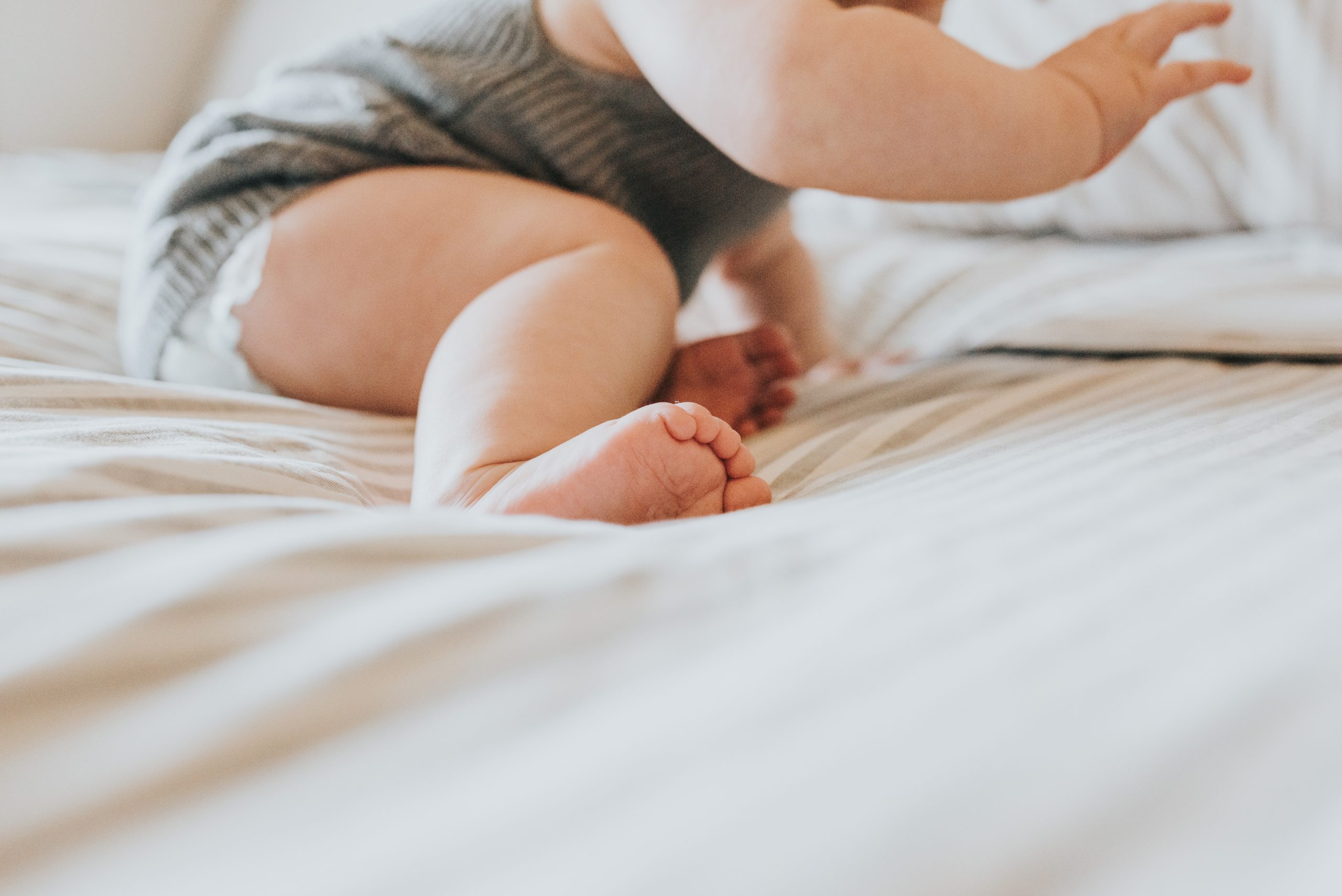
GET STARTED WITH A FREE CUSTOM SCHEDULE AND PLAN OVERVIEW ON OUR MOBILE APP →
TRY BATELLE FOR FREE →

Are you finding yourself asking, ‘Why is my baby not sleeping?’ As parents, it’s natural to worry when our little one’s sleep patterns change. In many cases, these changes align with key developmental milestones. Watching your little ones become increasingly aware of their surroundings and interact more meaningfully with the world around them is truly a joy for parents. However, as your baby reaches physical developmental milestones, as outlined in typical pediatric charts, such as sitting up, crawling, standing, and walking, you may notice a change in their sleep habits. This article aims to help you understand and navigate this exciting and sometimes challenging phase, offering practical advice along the way.
Between six and ten months old, babies start to learn various forms of movement. This includes hands-and-knees crawling, belly crawling, bear crawling, rolling, and bottom scooting. These movements often coincide with the 6-month sleep regression. Each new motor development presents an exciting and dynamic time for your baby. Eager to master these newfound abilities, they may practice whenever they can – even during naps and bedtime. Even if your baby is a good sleeper, such enthusiasm can throw off their usual sleep schedule and cause night waking and other disruptions, leading to periods commonly known as sleep regressions. But let’s view these as sleep “progressions” instead, as they are a sign of your little one’s growth and development.
Sleep disruptions are common any time your baby learns a new skill. Other developmental changes can have similar effects on naps and nights. The maturation of circadian rhythms around the 4-month mark (also known as the 4-month sleep regression), physical milestones such as standing as well as teething, or emotional developments such as separation anxiety, which often coincides with the 8-month sleep regression, can all lead to altered sleep patterns. As parents, understanding these developmental changes and their potential impact on your baby’s sleep patterns is essential in navigating these exciting and sometimes challenging times.
Crawling is a big step for your child’s development as it involves using their body and mind together. Crawling enhances eye-hand coordination, balance, and spatial awareness, and this new mode of movement also opens up a whole new world for them to explore, laying the foundation for future complex skills.
Just as we might find it hard to switch off our brains the night before a big exam, or on the eve of our wedding, your baby may also struggle to wind down after an exciting day full of exploration and discovery. The physical exertion and mental concentration required can lead to overstimulation, making it difficult for them to settle down for sleep. Their sleep spaces once used purely for rest, can now also become a practice field for their newly discovered forms of locomotion, leading to potential disruptions in their sleep patterns.
While learning to crawl can disrupt a baby’s sleep and cause increased fussiness during settling, there are ways to help your little one during the crawling development phase. Allow your baby plenty of time to practice crawling during the day, with lots of floor playtime, and even some time in their sleep space to practice and explore. Satisfying their curiosity in this way can reduce their desire to crawl during bedtime and nap time. A structured bedtime routine can also promote better sleep outcomes, signalling to your baby that it’s time to wind down and sleep.
As with most aspects of child-rearing, there’s no one-size-fits-all answer to how long the sleep disruption from learning to crawl lasts. It can vary from one baby to another but is typically a temporary phase, lasting anywhere from a few days to a few weeks. As your baby becomes more adept at crawling and the novelty of the new skill fades, their sleep patterns are likely to return to normal – until the next new skill is learned!
During this period of adjustment, maintaining a consistent sleep routine and being patient with your baby’s progress is key. That’s where sleep training with Sleep School can be an invaluable ally. It offers a sustainable and flexible response framework that allows you to give your little one the right amount of support when they need it most and pull back when they integrate this new gross motor skill and are able to return to better sleep habits.
By managing your response to sleep problems in an intentional manner, Sleep School helps you reduce both the intensity and duration of sleep disruptions whether they’re caused by progressions in development, changes to the sleep environment, illness, travel, or growth spurts. Remember, sleep regressions caused by developmental milestones can seem more intense and last longer if met with reactive solutions.
It’s only natural for your little one to want to crawl or move around during bedtime. Trying to prevent them from doing so can often lead to a power struggle and inadvertently prolong the sleep disruption. Likewise, inconsistent responses to bedtime troubles or middle-of-the-night wake-ups, such as introducing more overnight feeds or rocking them to sleep if that wasn’t already part of your routine can extend the duration of the sleep disruption. Sleep School’s approach encourages consistency and balance, helping you navigate these challenging times more effectively and ensuring your baby’s sleep habits improve as smoothly and quickly as possible.
Each new developmental milestone your child reaches is a cause for celebration, even if that means naps and/or nighttime sleep is temporarily disrupted. Whether it’s crawling at six to ten months old, walking at around 12 to 18 months old, beginning to talk at approximately 12 to 15 months old, or asserting their independence more around 2 years old – a change that can lead to what’s known as the ‘two-year-old nap strike’ – these milestones are exciting.
Embrace these developmental milestones as they come, knowing you have the tools and support to handle the sleep disruptions that may accompany them. In this journey of your baby’s early years, Sleep School will help ensure you both get the rest you need.
